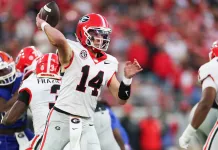When To Buy Points in College Football
If you’ve been around sports betting long enough, you’ve surely heard someone say, “Never buy points!” Never say never. There are certain situations where “don’t buy points” is certainly appropriate advice; however, there’s more nuance to the discussion and like anything else in sports betting, it comes down to one thing: the price. Now, the appropriate price will vary depending on which sport you’re talking about, but for today’s exercise, we will look specifically at the math behind when to buy – and not to buy – points in college football, depending on price.
Key Numbers
I’m going to do my best not to overcomplicate this, so bear with me. The first step in determining whether the price your book is offering is worth taking or not is understanding the importance of key numbers. Buying a half point from -9 to -8.5 is not the same thing as buying a half point from -7 to -6.5 due to the historical scoring distribution (this is even truer in the NFL, which we’ll cover another time). The same concept applies to 3; buying from -5.5 to -5 is not the same as -3 to -2.5. Now that we’ve established that we’re ONLY looking to potentially buy points around 3s and 7s, let’s break down some price equivalencies.
The Math
Let’s say you’ve decided you want to bet Team X at -7.5 (-110). Would this be an opportunity to explore buying a half point or more? Well, that depends on the price you can get to get to -7 or -6.5. -7.5 (-110) is equivalent to -7 (-125) and -6.5 (-139) in terms of probability; therefore, if you can get Team X -6.5 (buying a full point) at -138 or better, it is worth buying the point. Conversely, if the alternative prices at your book(s) are all -7 (-126) or worse and -6.5 (-139) or worse, then the “don’t buy points” crowd is correct in that instance. But again, it depends on the price.
What about underdogs? Let’s say you want to bet Team Y at +6.5 and the line doesn’t seem like it’s ever going to touch +7 (-110), when would it make sense to buy up? +6.5 (-110) is the equivalent of +7 (-124) and +7.5 (-137), so shop multiple books and see if you can get +7 at -123 or better or +7.5 at -136 or better. If not, play the +6.5 (-110) because that’s the best price.
Conclusion
Are you sensing the theme yet? Price is all that matters. There is no hard and fast rule that says always buy points or never buy points. A lot of people say never to buy a new car (as opposed to a used car), but if the dealership offers me a 2024 Corvette for the price of a 2002 Honda Civic, I’d probably take it. Again, price matters. One last note: this was a very high-level overview of price equivalencies, but obviously in sports betting, it is important to read the market and make your bets accordingly. That also includes having multiple sportsbook accounts to be able to shop around.
If you see a line steaming in the direction of your favor, that would not be the time to apply this logic. Getting the best price is the most important thing, whether that’s by buying on/off of key numbers or reading the market and getting the key number you want at standard -110 odds.
Also, this exercise was done comparing standard -110 odds, a change in that -110 would change the math and you’d have to adjust the equivalencies accordingly, which can be done using any number of online odds calculators.
I’ve attached a price equivalency chart for you to save and reference on your future CFB betting endeavors.





